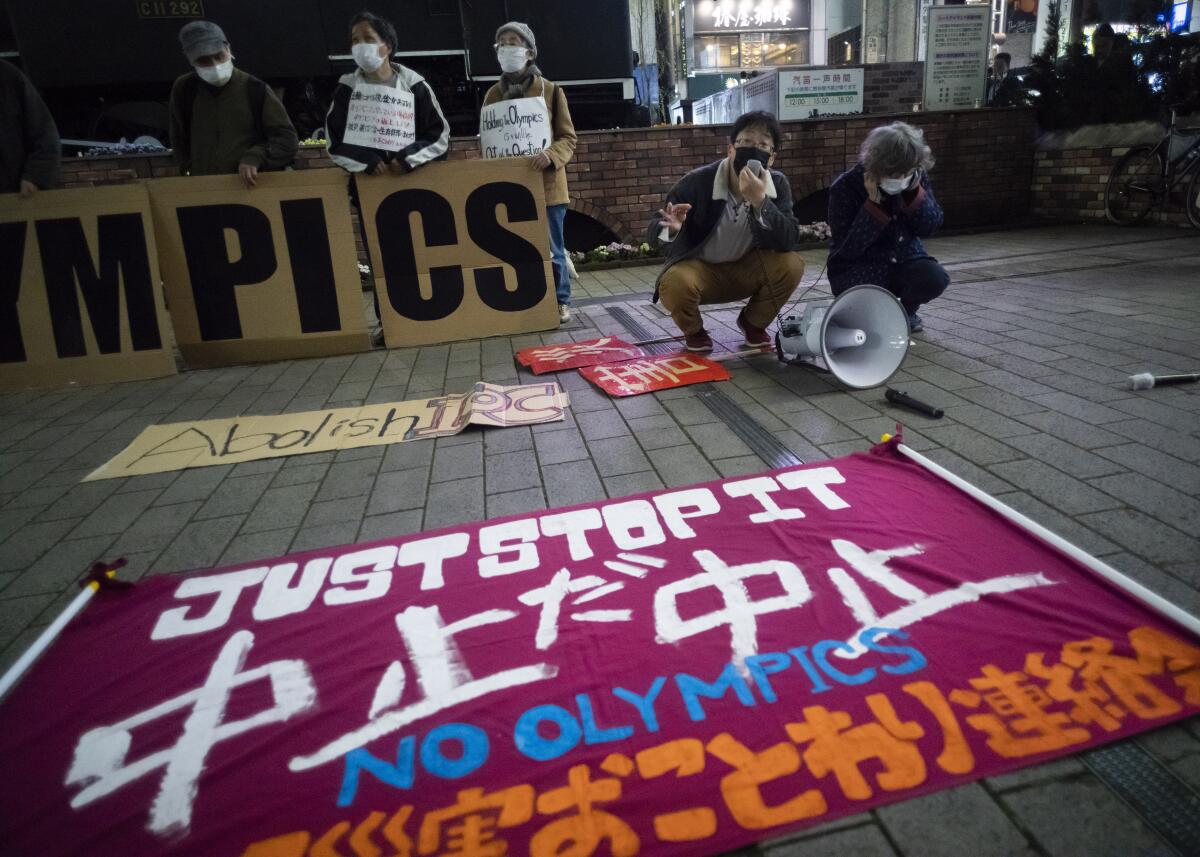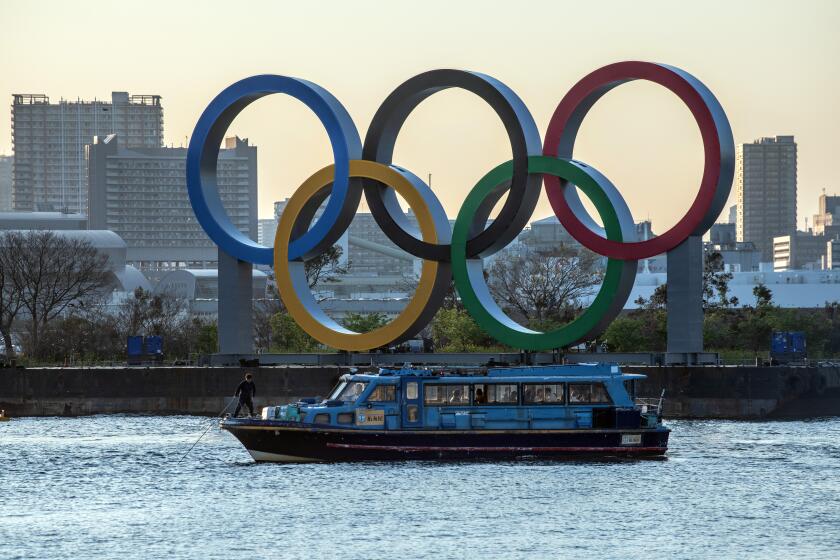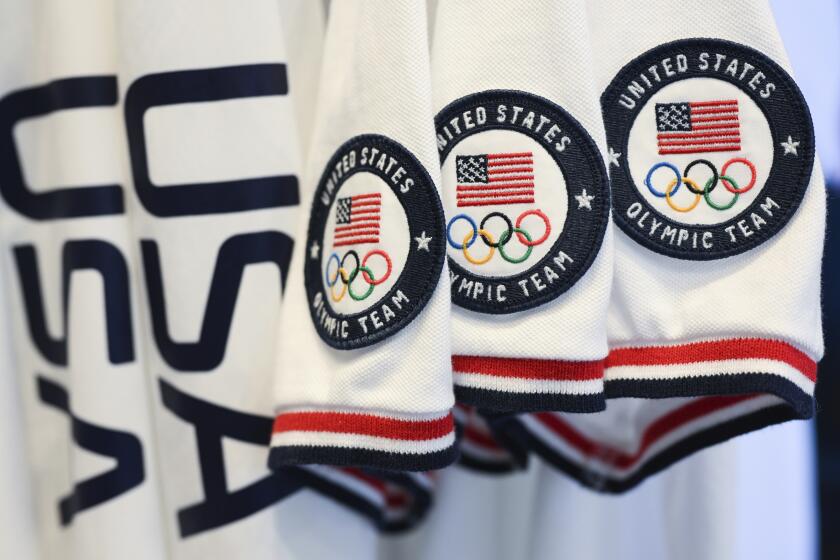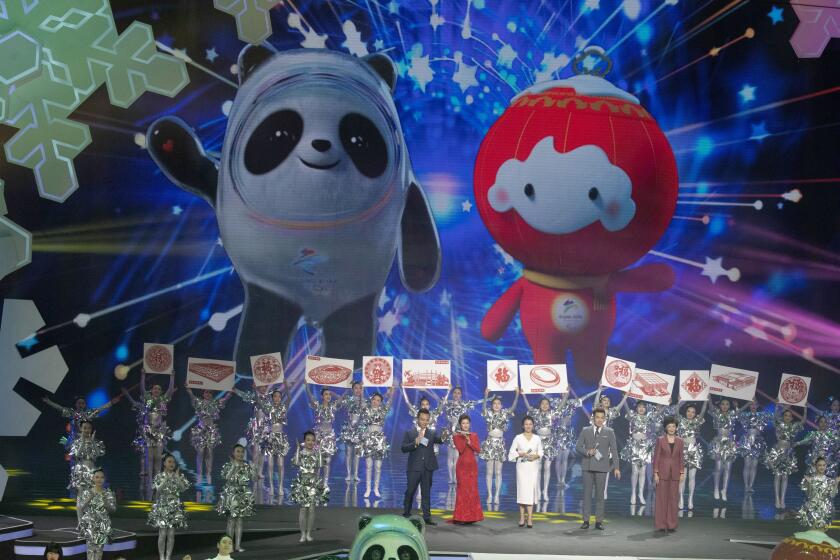Column: Olympics must be canceled after Japanese flip from fans to protesters amid COVID strain

- Share via
Several years ago, when Shohei Ohtani was playing in his home country, he was honored at an award show alongside Olympic gold medalist figure skater Yuzuru Hanyu.
When the presenter mentioned how they were both born in 1994, Ohtani acknowledged he wasn’t the most important athlete on stage.
“I think of myself [as] part of the Hanyu generation,” Ohtani said.
Olympic heroes become some of the most famous people in Japan, opening doors for them to become politicians (judoka Ryoko Tani, speed skater Seiko Hashimoto) and entertainers (wrestler Saori Yoshida). They marry pop stars (swimmer Kosuke Kitajima).
Because in ordinary times, the Japanese love the Olympics.
IOC and Tokyo Olympic officials remain committed to hosting the Games, despite the many challenges posed by the COVID-19 pandemic.
Be mindful of that when reading about polls showing that 60%-70% of Japanese people want the Tokyo Olympics to be canceled. Imagine how much has to be going wrong for them to want to call off an event they hold so dearly — one in their own country, no less.
This borders on madness, how the Olympics remain scheduled to start in less than 10 weeks.
Revelations on what is required to stage the Summer Games have simplified to the argument against them, as the Tokyo Olympics organizing committee is known to have requested the Japanese Nursing Assn. dispatch 500 nurses while asking 30 hospitals to admit infected athletes before other patients.
With less than 3% of its population vaccinated, and Tokyo and several other prefectures under extended states of emergency because of the spread of a new and more contagious strain of the coronavirus, there’s no justification for diverting medical resources from an already strained healthcare system.
Japan has very few intensive care beds, about five per 100,000 people in 2019, according to the Organization for Economic Co-operation and Development. Germany has almost 34 and the United States nearly 26.
As much money is at stake, the Summer Olympics in Tokyo have to be canceled, writes columnist Dylan Hernández.
As it is, the pandemic has claimed more than 11,000 Japanese lives, more than double the reported total of any other East Asian nation.
Those were the points made over and over again in a recent parliament meeting during which Prime Minister Yoshihide Suga came under attack from opposition lawmakers.
Suga was talking out of both sides of his mouth, saying one minute that he wasn’t prioritizing the Games ahead of the well-being of Japanese citizens and claiming in another the decision of whether to stage or cancel the three-week event was up to the International Olympic Committee.
As if the IOC could be trusted. Kiboshing the Olympics could dissuade other cities from wanting to host future Games, thereby jeopardizing the IOC’s very existence.
Suga wouldn’t say if the Olympics would still be held if infection rates were at Stage 3 (“rapid”) or Stage 4 (“explosive”).
Asked if his refusal to answer the question signaled Games would go on if infection rates were “explosive,” Suga replied, “I absolutely never said that.”
Suga repeated a line he said several times earlier about wanting to host Games that were safe for athletes while protecting the country’s citizens.
So the Olympics would be canceled if infection rates were at Stage 3 or 4?
American athletes headed for the Olympics in late July have varying opinions about the need to protect themselves against the coronavirus.
“My answer is what I just said,” Suga said.
Suga’s defiance was inspired by money and politics, the government looking to recoup some of the tens of billions of dollars it sunk into these Games against the backdrop of a national election later in the year.
Seventy-three percent of the IOC’s quadrennial $5.7 billion in revenue are from broadcast rights, as David Wharton of The Times has reported. NBC is the U.S. rights holder.
Suga’s approval rating has plunged to less than 40%, which makes sense considering he’s asking the country to go against its very nature by hosting the Olympics.
The Japanese operate carefully and methodically. They have reservations about outsiders.
Their low vaccination rate is a byproduct of this culture. Because of a general distrust of foreign drugs, Japan insisted on conducting its own domestic vaccine trials, which delayed the rollout and eliminated any chance of its population attaining herd immunity by the start of the Games on July 23.
Japan has already banned foreign fans and could soon ban domestic ones as well, but the country will still have to open its borders to tens of thousands of athletes, support staff and journalists.
Regardless of the Biden administration’s intention, the debate over boycotting the 2022 Winter Games in Beijing isn’t going away.
No wonder there are so many voices of opposition.
Even prominent business leaders have spoken out against the Olympics. The chief executive of online retailer Rakuten, Hiroshi Mikitani, called the Games a “suicide mission” in an interview with CNN. SoftBank chief executive Masayoshi Son told CNBC he would be “afraid” for Japan and other countries if the Olympics are held.
Two years ago, tennis star Kei Nishikori teamed with a comedy duo to promote the building of an Olympic monument. At that news conference, Nishikori spoke enthusiastically about the Games. By last week, his tone had changed entirely.
“If even one person dies,” he said, “it’s hard to get into.”
Alternate views aren’t welcome. When an economic advisor to Suga tweeted the Japanese equivalent of “LOL” to express his disbelief the Games could be canceled, there were widespread calls for him to resign.
Anti-Olympic sentiments have escalated to where celebrities have dropped out of the torch relay and sponsors have been reluctant to run advertisements linking them to the Games.
The case of swimmer Rikako Ikee was particularly instructive. Last month, the 20-year-old leukemia survivor became a national hero by qualifying for the Olympics. During the past couple of weeks, she received messages on social media demanding she withdraw from the Games. Ikee responded by Twitter by saying she understood the calls for cancellation and was personally concerned about the coronavirus because of her medical history. She concluded her four-tweet message by asking people to support athletes.
These Olympics were once called the “Reconstruction Games,” intended to celebrate the recovery of the Tohoku region from a devastating earthquake and tsunami that resulted in a nuclear disaster. Ironically, the Games themselves are now radioactive.
As catastrophic as it will be to call off the Olympics, the alternative figures to be worse.
More to Read
Go beyond the scoreboard
Get the latest on L.A.'s teams in the daily Sports Report newsletter.
You may occasionally receive promotional content from the Los Angeles Times.











